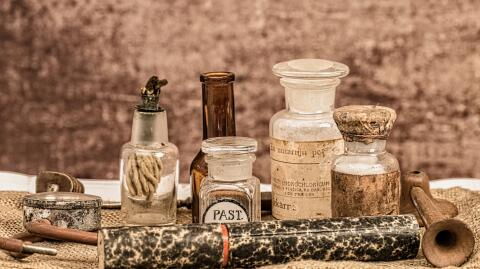It's definitely not just reality TV stars (hint: Kim Kardashian) who lose their jewelry in very weird places. It seems the same observation could be made back in the Bronze Age. The only difference is that, to this day, archaeologists still don't know who the jewelry belonged to. What's more, it wasn't recovered from the abyss, but from an agricultural field.
Discover our latest podcast
An ornament dating back to 1500 BC.
The discovery was made in Güttingen, in the north-eastern Swiss canton of Thurgau. An amateur archaeologist by the name of Franz Zahn had the pleasant surprise of stumbling across this set of jewels in a freshly ploughed carrot field! It's not the first time the treasure hunter has unearthed artifacts dating from the Iron Age and Bronze Age in the region. Aware of his precious find, as always, he immediately alerted the Thurgau Museum of Archaeology.
The researchers, who were subsequently able to carry out more extensive excavations, unearthed a complete jewelry set dating from around 1500 B.C. It consisted of a necklace adorned with bronze discs as pendants, spiral-shaped rings, around a hundred amber beads, bronze wire and gold. Among the set, the archaeologists also identified a rock crystal, an arrowhead and two other rather unusual objects: a perforated bear tooth and a fossilized shark tooth.
Read more:Archeologists unearth 2000-year-old child-sized shoe in Austria in excellent condition (PHOTO)
Who did this jewelry set belong to?
No human remains or graves were found in the immediate vicinity, ruling out the theory of a burial trousseau. Archaeologists believe that the jewelry must have been buried in an organic container, which had deteriorated over time. A similar discovery was made two years ago in the same canton of Thurgau.
By analyzing engravings from the period, the experts came to the conclusion that the jewelry found corresponded to the typical ornaments worn by women at the time. However, they are still unable to make sense of the ensemble. What was the purpose of the other elements, such as the bear and shark teeth? Were they amulets or barter objects? For the moment, the mystery remains unsolved.
Archaeologists uncovered a set of Bronze Age women’s jewelry, dating to around 1,500 BC, in a carrot field in Güttingen in Switzerland. The set contains a necklace made of bronze spiked discs, two spiral finger rings, more than a hundred amber beads and bronze and gold wire… pic.twitter.com/XO0INfebkq
— Ticia Verveer (@ticiaverveer) October 17, 2023
Read more:Archeologists unearth massive statue dating from Roman times near British motorway
This article has been translated from Gentside FR.
Sources used:
Thurgau: Bronzezeitlicher Schmuckhort in Güttingen entdeckt
MySwitzerland: Museum für Archäologie Thurgau















